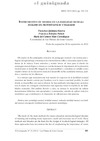Please use this identifier to cite or link to this item:
https://accedacris.ulpgc.es/jspui/handle/10553/12282
| Title: | Instrumentos de medida de la habilidad musical: análisis de metodologías utilizadas | Other Titles: | Instruments of measurement of the musical ability: analysis of methodologies used | Authors: | Quintana Guerra, Francisco Robaina Palmés, Francisco Mato Carrodeguas, María del Carmen |
UNESCO Clasification: | 58 Pedagogía 531204 Educación |
Keywords: | Habilidad musical Musica Music ability Musical Methodology Musical Ability, et al |
Issue Date: | 2012 | Journal: | El Guiniguada | Abstract: | El estudio de los principales métodos de pedagogía musical y las teorías psicológicas del aprendizaje constituyen dos herramientas útiles y necesarias para la enseñanza de la música. Estos métodos y teorías sirven de base para el diseño de estrategias metodológicas y tienen en común destacar la importancia de la educación musical para el desarrollo integral de la personalidad y coinciden en señalar como objetivo básico de la educación musical el desarrollo de las cualidades rítmicas, auditivas y creativas de los alumnos
Los trabajos que recientemente han tratado los aspectos de la habilidad musical muestran un interés común por localizar, con la mayor exactitud posible, la edad donde se desarrollan con mayor eficacia. Se han analizado investigaciones recientes con el objeto de conseguir conclusiones más rigurosas sobre la medida de las habilidades musicales. Del análisis llevado a cabo, se destaca la necesidad de utilizar herramientas didácticas más apropiadas y contrastadas, además de aplicar métodos estadísticos que contribuyan a la obtención de valoraciones más precisas. The study of the main methods for music education and psychological theories of learning and teaching music represent a useful and necessary set of tools. These methods and theories are the basis for the design of methodological strategies. All these approaches have in common the fact of emphasizing the importance of music education for the development of the personality, and all of them coincide in pointing out the basic objective of music education: develop rhythmic, auditory and creative skills in students. Within the different studies which have recently dealt with various aspects of musical ability, a common interest in being able to determine as closely as possible the age at which these abilities develop more effectively has ben discussed. Also, in recent research studies there has been a clear intention of obtaining more rigorous conclusions towards the measurement of musical skills. From the analysis carried out, it should be noted the need of being able to apply more efficient didactical tools, together with statistical models, which contribute to obtaining more accurate assesments. |
URI: | https://accedacris.ulpgc.es/handle/10553/12282 | ISSN: | 0213-0610 | Source: | El Guiniguada [ISSN 0213-0610], v. 21, p. 105-115, (2012) |
| Appears in Collections: | Guiniguada. 2ª Etapa. n.21, 2012 Artículos |
Page view(s) 5
443
checked on Jan 15, 2026
Download(s)
736
checked on Jan 15, 2026
Google ScholarTM
Check
Share
Export metadata
Items in accedaCRIS are protected by copyright, with all rights reserved, unless otherwise indicated.
